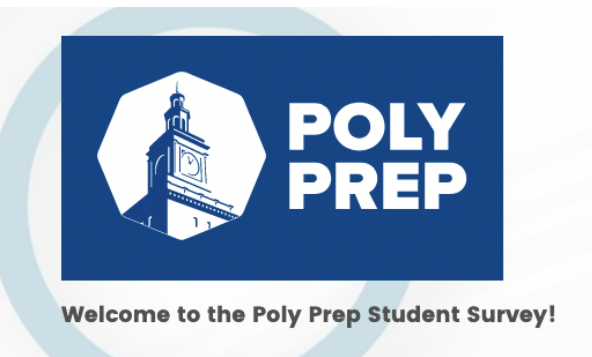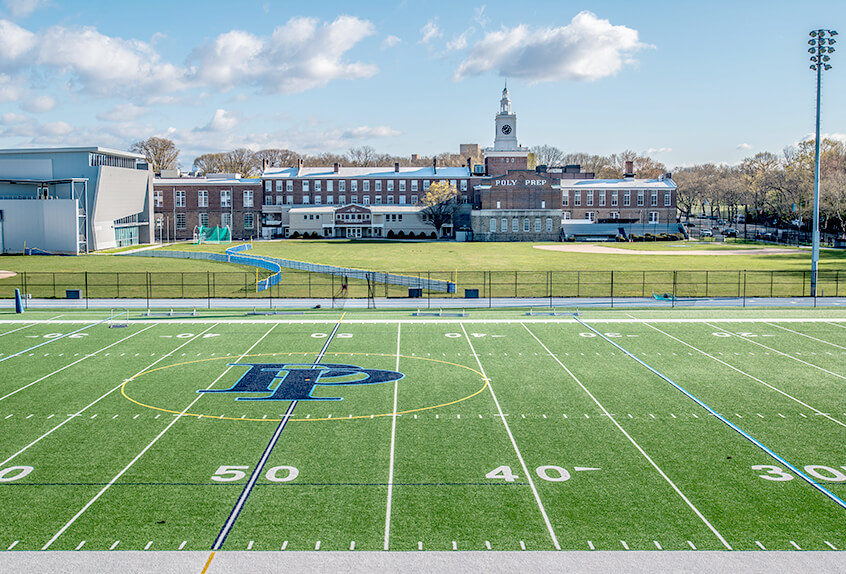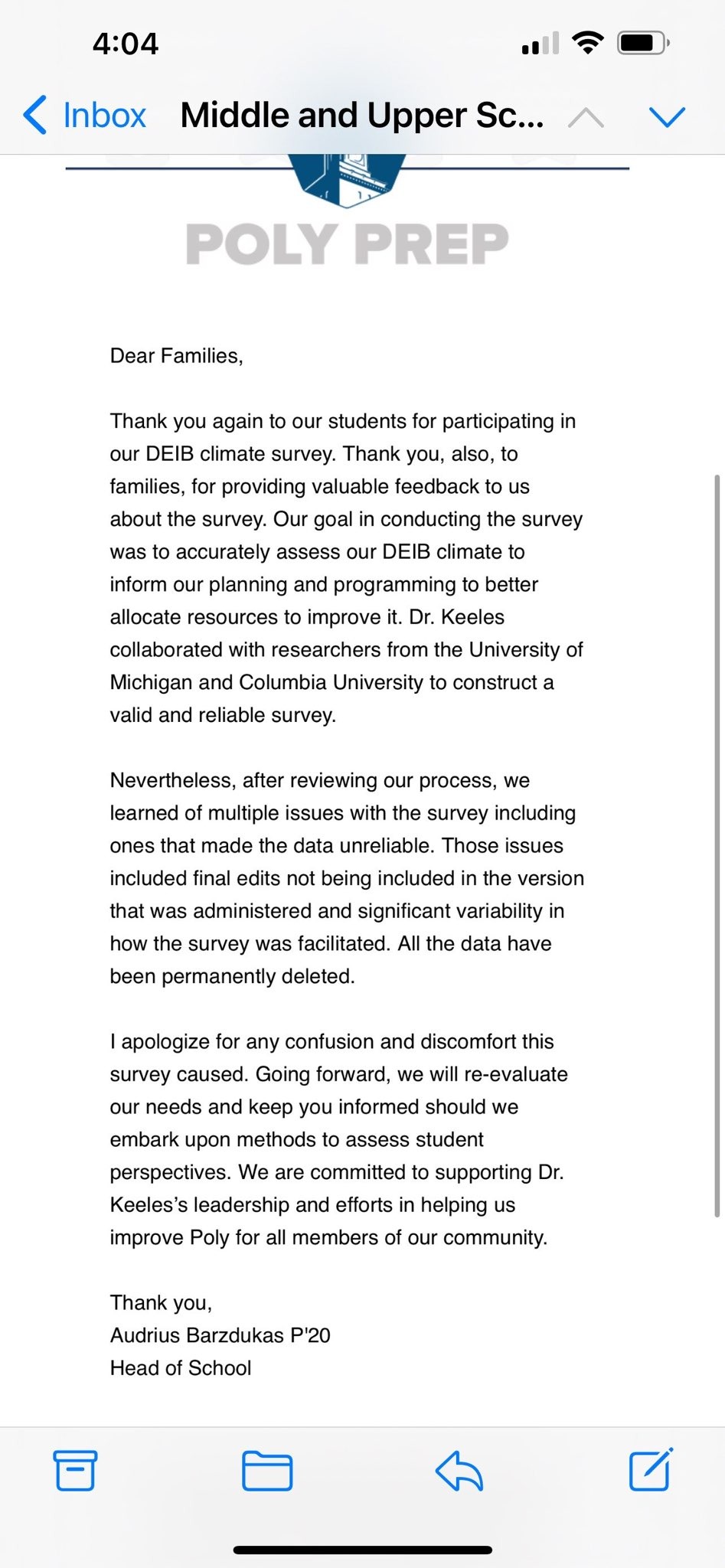
Poly Prep Country Day School administers 62-page “DEIB Climate Survey” which garners parent outrage and a retraction
Incidents

After administering 62-page “DEIB Climate Survey” to students in grades 5-12 which included questions about sexual identity/orientation, political affiliation, mental health, parent income, disability status, and personal beliefs about concepts related to “social identity theory”, Poly Prep Country Day School apologizes and tells parents that all survey data has been permanently deleted. Parents speak up. School listens.

Poly Prep
Poly Prep Country Day School is an elite New York City preK-12 private school with two campuses in Brooklyn. The school was founded in 1854. Poly Prep is a member of the National Association of Independent Schools (NAIS) and the New York State Association of Independent Schools (NYSAIS).
DEIB climate survey controversy
In May 2022, a concerned parent provided Parents Defending Education a copy of the “DEIB Climate Survey” administered to Poly Prep students as well as a copy of a letter Poly Prep Head of School (HOS) Audrius Barzdukas sent to parents explaining that the survey had been retracted and that all survey data had been permanently deleted.
DEIB stands for “diversity, equity, inclusion, and belonging. “DEIB climate surveys”–which school administrators say are administered to solicit student feedback to improve their schools–have become a hot button issue between parents and schools since concerns came to light in the fall of 2021 about the survey company Panorama Education’s possible data mining of student information.
In the letter Poly Prep parents received about the survey’s cancellation, HOS Barzukas explained that the survey was intended to “inform our planning and programming” but that there were “multiple issues with the survey including ones that made the data unreliable.”
Parents contacting Parents Defending Education said Poly Prep parents had expressed outrage to school administrators over the survey. One high school student said, “I don’t want to tell my school my sexual orientation.”
Parents reported their discomfort with their children being expected to divulge personal information that they may not have, may not understand, and may not want to share.
Concerns centered around privacy, age-inappropriateness, and whether students are unwittingly being used as “guinea pigs” for a researcher’s academic inquiry projects.
In the letter, Barzdukas further explained that Dr. Omari W. Keeles, Poly Prep’s director of diversity, equity, and inclusion had “collaborated with researchers from the University of Michigan and Columbia University” in constructing the survey.
Higher ed influence
The University of Michigan has made news for its largest-in-the-nation university DEI department. Critics contend DEI departments create racial division on campus and push activist/ideological content in place of academically rigorous curriculum, resulting in “DEI-caused deficits” in learning outcomes.
The Teachers College at Columbia University bills itself as “well-positioned” in the student survey business: “With the recent passage of the Every Student Succeeds Act, [Teachers College Survey Research Initiative] SRI is especially well-positioned to help you measure non-academic outcomes.”
Poly Prep’s DEI director
Dr. Keeles commenced his work as Poly Prep’s DEI director in July 2021. Prior to that, he earned an education/psychology PhD from the University of Michigan and several other degrees.
His 2020 PhD dissertation is entitled:
“Class Matters: Social Class Identity Profiles of Black Students and Implications for Psychological Adjustment to Predominantly White Institutions.”
In his dissertation Dr. Keeles concluded that “students who reported high levels of social class pride reported more adaptive psychological adjustment to the [predominantly white institution] context.”
Poly Prep is a predominantly white institution.
Dr. Keeles’ dissertation
Poly Prep’s DEIB climate survey
In the DEIB climate survey, students were asked to rank statements on a five-point scale from “really disagree” to “really agree”. All questions were required and most questions did not include any answer choices like, “other”, “I don’t know”, or “n/a”.
Sampling of questions about “social identity”:
- I am proud to be a member of my racial/ethnic group.
- Most people think that people from my racial/ethnic group are as smart as people of other racial/ethnic groups.
- I have a strong sense of belonging to other people from my social class.
- Women have fewer chances to get ahead.
- Poor children have fewer chances to get a good high school education.
- Students here think it’s good to study with people of different races/ethnicities.
- In your classes you’ve learned new things about your culture.
- In your classes you have learned about how race/ethnicity plays a role in who is successful.
- Teachers teach about racial inequality in the United States.
Sampling of questions about mindset:
- I can learn new things, but I don’t have the ability to change my basic intelligence.
- I believe I can always substantially improve on my intelligence.
Sampling of questions about community:
The survey included questions about the Poly Prep community and how connected students felt such as: “Sometimes I feel as if I don’t belong in my school.”
Sampling of questions about discrimination:
- Over the past 12 months, how often have you experienced discriminatory or unfair events at Poly Prep because of your:
Answer choices:
- Ability or disability status
- Race or ethnicity
- Sex
- Sexual orientation
- Gender identity or gender expression
- National origin
- Age
- Religion
- Height or weight
- Political orientation
- Social class
Sampling of questions about “application prep”:
The survey asked if students had participated in the programs “Prep for Prep”, “A Better Chance ABC”, and “Oliver Scholars”. These are programs to prepare and place students “of color” at New York City independent schools including Poly Prep.
Sampling of questions about personal matters:
There were several questions about mental health and depression. The question “What gender best describes you?” included the possible response: “gender variant”. The question “What is your sexual orientation” included the possible response: “pansexual/omnisexual”. There were questions related to social class, political beliefs, race, and whether or not the student’s family had “made a financial donation to Poly Prep”. Students were asked to report their GPAs and to indicate how much money their parents earn.
The survey was not anonymous as students were asked to input their email addresses.
Poly Prep’s 62-page “DEIB Climate Survey”:
Social experiment, or school?
The survey raises questions about the priorities and purpose of Poly Prep.
What are the goals of Poly Prep’s admissions office and DEI office? How do affiliated organizations such as NAIS, NYSAIS, “Prep for Prep”, “A Better Chance ABC”, and “Oliver Scholars” influence Poly Prep’s mission and policies? Poly Prep does not publish its student admissions criteria so it is unclear how participation in these programs factors into admissions.
Critics of affirmative action admissions policies contend that these policies cause students to question the fairness of the process and question the ability of their peers. Affirmative action in higher ed is currently being challenged in the Supreme Court case Students for Fair Admissions Inc. v. President & Fellows of Harvard College.
Are Poly Prep’s administrators more focused on social experiments, or school? Are students at Poly Prep unwittingly being used as research subjects to study the correlation between “social identity” and academic outcomes, especially given Dr. Keeles’ graduate school work? And how are white hetrosexual male students at Poly Prep supposed to answer questions about “racial” and “group” pride anyway?
Dr. Keeles holds the following degrees:
| School | Degree | Year |
| University of Michigan | Doctor of Philosophy (PhD), Education/Psychology | 2019 |
| University of Michigan | Master of Science (M.S.), Psychology | 2015 |
| VU Amsterdam | Certificate, Summer School on Black Europe | 2014 |
| Teachers College, Columbia University | Master of Education (M.Ed.), Psychological Counseling | 2008 |
| Teachers College, Columbia University | Master of Arts (M.A.), Psychological Counseling | 2007 |
| The George Washington University | Master of Public Health (M.P.H.), Maternal and Child Health | 2003 |
| Howard University | Bachelor of Science (B.S.), Psychology | 2002 |
| Université de Bourgogne | Certificate, French Language and Culture | 2001 |
Diversity
Since July 2021 when Dr. Keeles commenced his role as Poly Prep’s DEI director, the school has stepped up its focus on race and identity.
Poly Prep’s tagline on the main page of its website reads: “Meeting the future through the diversity of our community.” The school’s “diversity, equity, inclusion, and belonging” webpage calls out “systems of power” and “progressive change”: “A healthy multiracial democracy requires learning to honor the widest range of diverse voices and demands that we train all of our students to think critically about systems of power so that they can fulfill their responsibility to engage in purposeful progressive change.”
2020 transformation
Poly Prep seems to have undergone a marked transformation in school policies, curriculum, and activities during 2020:
- On June 9, 2020, the school hosted a “lunch & learn” workshop entitled: “A Space for Students to Discuss Racism”. “Lunch & Learn is a new initiative, said History Department Chair Maggie Moslander, “developed in response both to student interest in these topics and to the need to help our community understand the historical roots of systemic racism in the United States and its contemporary manifestations.”” The topic for one session: “Reparations for African Americans: Why and How?”
- On June 11, 2020 at the Grade 4 class graduation seemed to be overshadowed by talk of George Floyd: “Grade 4A Head Teacher Garrett Kennedy commiserated with parents that quarantine may have seemed like living out the movie Groundhog Day, but said the 26 fourth graders had given their teachers “little, yet important, victories each day” with their “perspectives on real-life issues” including the murder of George Floyd. Kennedy said it was important for Grade 4, who had studied slavery this year, to “never forget George Floyd’s name” and to “use this tragedy as a catalyst to truly make this a better place….”.”
- On June 16, 2020, Grade 7 created an “art activism gallery”: “Grade 7 History responded to murder of George Floyd by creating an art & activism gallery.”
- On July 20, 2020, the Poly Prep parent group held an online reading and discussion group about BLM: “As Black Lives Matter protests filled streets across America this spring, Poly’s Freedom from Bias (FFB) parent group stepped in to help Poly parents understand the movement–and the context.”
- On August 12, 2020, the Poly Prep faculty met to begin work on curriculum based on “anti-racism”: “Faculty Professional Development Sessions Address Hybrid Learning and the Importance of Creating an Anti-Racism Curriculum.”
2022 DEI in the classroom
Schedule
Now Poly Prep’s bell schedule includes a “DEIB block” class period, crowding out instructional minutes and raising concerns about indoctrination taking place during class time.
Curriculum
The English and History course curricula seem to include works chosen for their identity themes and critical theories approaches that tie into discussions about the Poly Prep campus and community. Poly Prep has added several new and controversial classes to its offering such as an 11th grade history class entitled: Black Power-Black Arts.
9th Grade English Class–Students read: “Nervous Conditions”, by Tsitsi Dangarembga about one girl’s struggle to “coexist in her contradicting universes: that of her homestead and that of the wealthier mission school.”
11th Grade Black Power-Black Arts History Class–Assignment: “Create an artwork and write an artist statement that examined the significant ideological patterns and life experiences of Malcolm X shown in their [sic] artwork. A significant focus of the project required students to see Malcolm X as a human being and, as his friend Ossie Davis said, as a man that “did not hesitate to die [for Black people], because he loved us so.””

Stay Informed
